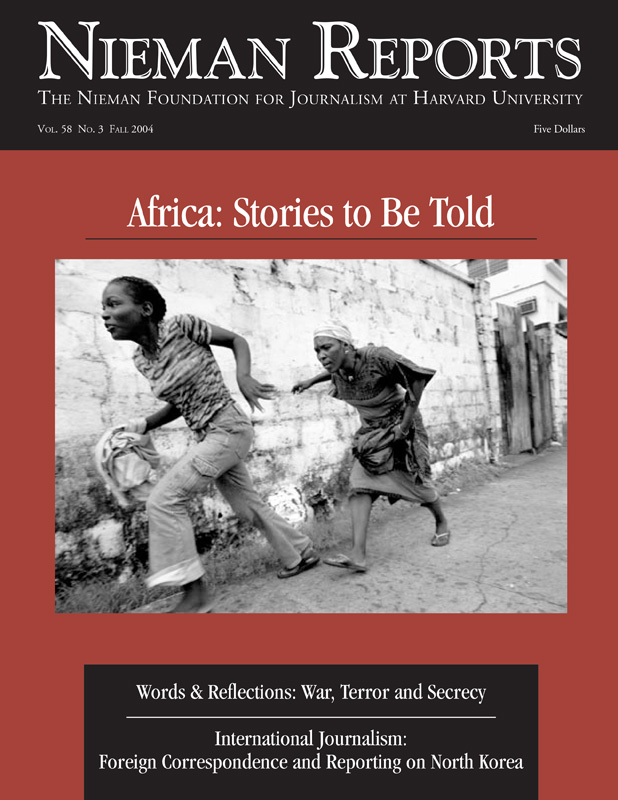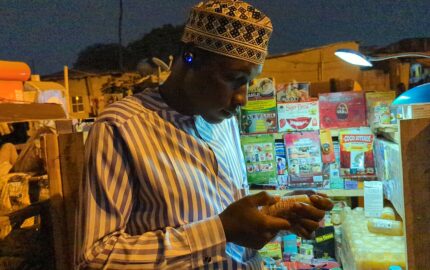
Africa: Stories to Be Told
Africa is portrayed in the Western media by its extremes, observes Ugandan journalist Charles Onyango-Obbo, a managing editor with the Nation Media Group in Nairobi, Kenya. Stories about its civil wars, human rights abuses, government corruption, disease and poverty abound, but these have been joined by Western reporting that, in Onyango-Obbo’s opinion, can be too willing to celebrate the promised reforms of emergent leaders for whom greater journalistic scrutiny should be applied. The result: “… the leadership in Africa became not only complacent, but also used the flattering international coverage to muzzle internal critics and vigorous independent reporting ….”
At The Namibian, we’ve experienced successes and some failures due to a number of factors both within and outside our control. Our success in ensuring the survival of the newspaper has involved a great deal of management during times of crisis. Highlighting some aspects of this management might be helpful to others who face similar situations.
Maintain an Independent Editorial Policy: Being a newspaper that is not tied to any political party or commercial interest has stood us in good stead in cases of conflict with the authorities. Although governments in Africa continue to accuse independent media of being, in the Zimbabwe example, “running dogs of the imperialists,” or, in our case, of siding with the political opposition, these claims are without basis in fact. So it is vital that we remain true to our principles of independent reporting. The Namibian consistently adheres to a clear set of ideals, and this has helped us steer our course, often through very stormy waters. Our founding ethos of being a newspaper committed to democracy and the maintenance of human rights remains strongly in place today.
Build a Committed Staff: The value of this is not to be underestimated, particularly in crisis situations, for staff members contribute to the ethos of a publication, and this, in turn, earns the support of a readership or listeners or viewers. Brave individuals were the pioneers during the struggle for journalism in the fight against apartheid domination of our subcontinent. Regretfully, courageous people seem to be in shorter supply in our part of the world today. Perhaps this is not surprising since it requires being in the forefront of danger with conflict so prevalent. Yet courage remains an important characteristic for journalists working in independent media.
Become Free From Donor Funding: Donor funding was vital to The Namibian as it struggled to get started prior to independence. Donors should ensure that funding is not summarily cut, but should reduce it gradually so that independent media can come to grips with sustainability as soon as possible. Those in power in Africa, who are often the recipients of vast amounts of donor funding, tend to accuse media of being manipulated by foreign agendas when they receive assistance.
Aim to Be the Peoples’ Paper: The Namibian has always managed to stay in touch with its readers. During the nation’s years of struggle, we provided an outlet for the voice of opposition against apartheid domination, and through this process we earned what have been called “our struggle credentials.” Because our journalists regularly traveled into military zones in remote rural areas of the country, our base has never been purely urban. Even in our democracy today, unfortunately, deeply instilled fears of the former regime appear to persist in a country in which free speech is guaranteed. Namibia is largely one-party dominated and SWAPO [South West Africa People’s Organization] has not yet managed to complete the transition from an autocratic liberation movement to a democratic political party. It retains an overwhelming two-thirds majority in the government, so The Namibian continues to speak out when many still fear to do so, particularly on issues such as the lack of good governance and the effects of corruption.
Ownership is Key to Survival: Newspapers run by journalists are becoming even more vital in today’s world. In the so-called First World, business managers are taking over, and this results, too frequently, in the unfortunate fact that profits dominate, not principles. This same situation is perhaps contributing to an erosion of newspapers in various parts of the world. In our case, we were largely self-taught. Having been with the newspaper since its inception, I believe it is possible to balance principle and profit. For example, The Namibian resists increases in its cover price, aware that information must be accessible to the people, especially in emergent democracies.
Support Creative Management: In the face of adversity, there needs to be a creative approach by the management of any independent media institution. It is a question of strategy. While not easy to prescribe, since situations and threats differ from one country to another, it is important not to simply abandon a project when all possible avenues of survival have not been explored. Here the examples of private radio in Zimbabwe, such as SW, Radio Dialogue, and Voice of the People, are worth noting. When denied licenses to broadcast from within the country, they found creative ways to get around repressive legislation by broadcasting from outside the country via short wave. Similar innovation could also be applied to the struggle for financial survival, and new media technologies make it possible for media battling for self-sufficiency to offer other services, such as assistance with layout and design, to put money into their coffers and find alternative sources of income to survive.
Maintain High Professional Standards: Even in times when the practice of journalism is most difficult, when avenues of access to information are often cut off or denied to the publication in question, it is important that independent media maintain high professional standards. It is harder for authorities to clamp down on a publication or radio station that has a near impeccable record. In our situation, even though the government does not necessarily approve of what the newspaper writes, The Namibian has nevertheless become the newspaper of choice. Even our opponents in the state feel obliged to read us.
Recognize the Importance of Training: If we believe that self-sufficiency is essential for political survival of media in conflict and post-conflict situations, then the training, in particular, of media management is necessary. There are a number of such initiatives in several parts of the world, including southern Africa, in which managers of emerging media are assisted in the areas of management and training with a view to sustainability. In our case we learned by trial and error, and I was forced to develop business acumen to ensure the financial survival of the newspaper. But, when possible, this should not be left to chance. Management training can bolster a media outlet’s chances of survival. I am often critical of how certain training initiatives in our country are undertaken, and this probably applies in other parts of the world as well. Some, though not all, nongovernmental organizations with money to spend launch training initiatives with little consultation with the media people in the country or region. This often results in an ad hoc approach. It is vital that local media organizations are consulted on their needs before such courses are embarked upon.
Use Access to the Courts: During times of crisis, media should make use of the courts and receive assistance to do so. Many impediments to the survival of independent media are legislative in nature and need to be challenged in courts of law. As we found, even the most draconian systems have loopholes. In Namibia and in South Africa during apartheid, we were able to achieve a measure of independence and continue to publish our newspaper because of our use of the courts. Circumstances with the court system are not the same in all countries and, in the case of Zimbabwe, almost all possible loopholes have been closed. But media in such situations should exploit weaknesses in the system to any extent they can in order to survive.
Remain Lean and Mean: For want of a better expression, it is very important that independent media be managed on modest budgets. This is an essential key to our survival. At The Namibian, we can and do look after the basic needs of our journalists, but we avoid excessive salaries and lavish spending, especially for the most senior employees. In too many examples I’ve witnessed, or where I’ve assisted community independent media start up, commitment is tested when resources are meager. And there usually must be a tough transition period prior to sustainability. One should not forget that many big commercial media are being forced to cut back on staff and content and/or programming largely because of bureaucracy and overexpenditure.
Maintain an Independent Editorial Policy: Being a newspaper that is not tied to any political party or commercial interest has stood us in good stead in cases of conflict with the authorities. Although governments in Africa continue to accuse independent media of being, in the Zimbabwe example, “running dogs of the imperialists,” or, in our case, of siding with the political opposition, these claims are without basis in fact. So it is vital that we remain true to our principles of independent reporting. The Namibian consistently adheres to a clear set of ideals, and this has helped us steer our course, often through very stormy waters. Our founding ethos of being a newspaper committed to democracy and the maintenance of human rights remains strongly in place today.
Build a Committed Staff: The value of this is not to be underestimated, particularly in crisis situations, for staff members contribute to the ethos of a publication, and this, in turn, earns the support of a readership or listeners or viewers. Brave individuals were the pioneers during the struggle for journalism in the fight against apartheid domination of our subcontinent. Regretfully, courageous people seem to be in shorter supply in our part of the world today. Perhaps this is not surprising since it requires being in the forefront of danger with conflict so prevalent. Yet courage remains an important characteristic for journalists working in independent media.
Become Free From Donor Funding: Donor funding was vital to The Namibian as it struggled to get started prior to independence. Donors should ensure that funding is not summarily cut, but should reduce it gradually so that independent media can come to grips with sustainability as soon as possible. Those in power in Africa, who are often the recipients of vast amounts of donor funding, tend to accuse media of being manipulated by foreign agendas when they receive assistance.
Aim to Be the Peoples’ Paper: The Namibian has always managed to stay in touch with its readers. During the nation’s years of struggle, we provided an outlet for the voice of opposition against apartheid domination, and through this process we earned what have been called “our struggle credentials.” Because our journalists regularly traveled into military zones in remote rural areas of the country, our base has never been purely urban. Even in our democracy today, unfortunately, deeply instilled fears of the former regime appear to persist in a country in which free speech is guaranteed. Namibia is largely one-party dominated and SWAPO [South West Africa People’s Organization] has not yet managed to complete the transition from an autocratic liberation movement to a democratic political party. It retains an overwhelming two-thirds majority in the government, so The Namibian continues to speak out when many still fear to do so, particularly on issues such as the lack of good governance and the effects of corruption.
Ownership is Key to Survival: Newspapers run by journalists are becoming even more vital in today’s world. In the so-called First World, business managers are taking over, and this results, too frequently, in the unfortunate fact that profits dominate, not principles. This same situation is perhaps contributing to an erosion of newspapers in various parts of the world. In our case, we were largely self-taught. Having been with the newspaper since its inception, I believe it is possible to balance principle and profit. For example, The Namibian resists increases in its cover price, aware that information must be accessible to the people, especially in emergent democracies.
Support Creative Management: In the face of adversity, there needs to be a creative approach by the management of any independent media institution. It is a question of strategy. While not easy to prescribe, since situations and threats differ from one country to another, it is important not to simply abandon a project when all possible avenues of survival have not been explored. Here the examples of private radio in Zimbabwe, such as SW, Radio Dialogue, and Voice of the People, are worth noting. When denied licenses to broadcast from within the country, they found creative ways to get around repressive legislation by broadcasting from outside the country via short wave. Similar innovation could also be applied to the struggle for financial survival, and new media technologies make it possible for media battling for self-sufficiency to offer other services, such as assistance with layout and design, to put money into their coffers and find alternative sources of income to survive.
Maintain High Professional Standards: Even in times when the practice of journalism is most difficult, when avenues of access to information are often cut off or denied to the publication in question, it is important that independent media maintain high professional standards. It is harder for authorities to clamp down on a publication or radio station that has a near impeccable record. In our situation, even though the government does not necessarily approve of what the newspaper writes, The Namibian has nevertheless become the newspaper of choice. Even our opponents in the state feel obliged to read us.
Recognize the Importance of Training: If we believe that self-sufficiency is essential for political survival of media in conflict and post-conflict situations, then the training, in particular, of media management is necessary. There are a number of such initiatives in several parts of the world, including southern Africa, in which managers of emerging media are assisted in the areas of management and training with a view to sustainability. In our case we learned by trial and error, and I was forced to develop business acumen to ensure the financial survival of the newspaper. But, when possible, this should not be left to chance. Management training can bolster a media outlet’s chances of survival. I am often critical of how certain training initiatives in our country are undertaken, and this probably applies in other parts of the world as well. Some, though not all, nongovernmental organizations with money to spend launch training initiatives with little consultation with the media people in the country or region. This often results in an ad hoc approach. It is vital that local media organizations are consulted on their needs before such courses are embarked upon.
Use Access to the Courts: During times of crisis, media should make use of the courts and receive assistance to do so. Many impediments to the survival of independent media are legislative in nature and need to be challenged in courts of law. As we found, even the most draconian systems have loopholes. In Namibia and in South Africa during apartheid, we were able to achieve a measure of independence and continue to publish our newspaper because of our use of the courts. Circumstances with the court system are not the same in all countries and, in the case of Zimbabwe, almost all possible loopholes have been closed. But media in such situations should exploit weaknesses in the system to any extent they can in order to survive.
Remain Lean and Mean: For want of a better expression, it is very important that independent media be managed on modest budgets. This is an essential key to our survival. At The Namibian, we can and do look after the basic needs of our journalists, but we avoid excessive salaries and lavish spending, especially for the most senior employees. In too many examples I’ve witnessed, or where I’ve assisted community independent media start up, commitment is tested when resources are meager. And there usually must be a tough transition period prior to sustainability. One should not forget that many big commercial media are being forced to cut back on staff and content and/or programming largely because of bureaucracy and overexpenditure.


